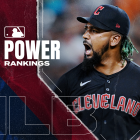As Major League Baseball and Minor League Baseball continue to negotiate a new Professional Baseball Agreement, one point of contention between the sides has received more attention than any other: MLB's desire to delist nearly a quarter of the minors (42 teams in all) from organized baseball. MiLB, predictably, isn't a fan of the proposed arrangement (and neither is Congress, for that matter).
Commissioner Rob Manfred addressed MLB's perspective on the issue on Thursday, focusing on four talking points, according to Laura Albanese of Newsday. Those four points include:
- So-called "inadequate facilities"
- Untenable travel due to franchise relocation
- "Poor pay for minor leaguers"
- Drafting and signing players who "don't have a realistic opportunity to make it to the majors"
Let us point out that there are some fairly straightforward solutions to most of the issues Manfred identified -- and they don't involve trimming the minors by 40-something affiliates. For instance, the "untenable travel" part can be solved with clever realignment across levels -- something MLB would need to enact if they get its way. As for the third point, teams could solve that issue by paying the players more -- they just don't want to because it would necessitate the owners taking in lower profits.
The combination of the third and fourth points are notable because together MLB is essentially asking the players it deems to be legitimate prospects to sell out their lesser teammates in the name of making more money. It's a cute trick for MLB in another sense, too -- they can crow about giving raises, all the while the actual costs would be significantly less due to the elimination of so many jobs.
There's a good deal of hubris involved here, obviously, beginning, on a micro level, with the belief that MLB teams are so skilled at talent evaluation that slashing so many jobs wouldn't hurt the product. If some teams don't believe there's benefit in employing non-prospects, then they should be allowed to cut out a few teams. But why MLB feels the need to make it a blanket position is anyone's guess.
On top of that, MLB continues to ignore that minor-league baseball is an affordable alternative for most fans who can't afford to attend big-league games due to financial and/or geographical restraints. MLB is essentially making the in-person experience a luxury good. That seems like a myopic strategy for a game that often states its intent to attract new fans.
Perhaps parts of MLB's plan would be better received in a different day and age. But it's hard to look at what they're doing here, in conjunction with everything else going on with the game, and see this as a good-faith effort to improve and grow the game of baseball.


















